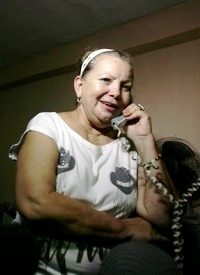
Following a meeting on July 7 between Cuban President Raul Castro and Roman Catholic Cardinal Jaime Ortega, Archbishop of Havana, the diocesan office released an announcement that the Cuban government has agreed to set free 52 political prisoners and allow them to leave the country.
A report from CNN noted that the announcement coincided with a visit by Spain’s Foreign Minister, Miguel Angel Moratinos, who met on July 7 with his Cuban counterpart Bruno Rodriguez, as well as President Castro and Cardinal Ortega. The next day, Spanish diplomatic sources cited Moratinos’ statement that Spain has agreed to accept all 52 political prisoners.
CNN quoted Secretary of State Hillary Clinton, who said she spoke with Moratinos on the evening of July 7 and was “encouraged” by the agreement. “We think it is a positive sign, something that is overdue, but nevertheless welcome,” Clinton said.
The Miami Herald cited a July 8 church statement identifying the first five political prisoners to be released as Antonio Villarreal Acosta, Lester González Pentón, Luis Milán Fernández, José Luis García Paneque, and Pablo Pacheco.
Pacheco’s wife, Oleivys García, told El Nuevo Herald (the Spanish-language sister paper to the Miami Herald) she was surprised when she visited him in a Ciego de Avila prison on July 8 and learned Cardinal Ortega had just called Pacheco to let him know he would be freed. “We were surprised ” Garcia said via telephone from Cuba. Her husband “told me he thanked Ortega, who was very courteous, and told him that he was glad to be one of the first released, but hoped he would not be one of the last.”
The Herald also reported that Pacheco, an independent journalist who had been serving a 20-year sentence, had been writing a blog from jail entitled “Voz Tras las Rejas” (“Voice From Behind The Bars”) with the help of a blogger named Claudia Cadelo. The report did not offer any explanation for the unusual freedom given to a prisoner to engage in such activities — freedom not usually given to prisoners in the United States, who enjoy First Amendment protections for freedom of speech and the press that are non-existent under the oppressive communist regime in Cuba.
Following the announcement of the release of the prisoners, Cuban dissident Guillermo Fariñas ended a 135-day hunger strike he had begun on February 24 to protest the death of political prisoner Orlando Zapata following his own 83-day hunger strike, and to demand the release of 26 other political prisoners reported to be in ill health. Two bloggers, the aforementioned Claudia Cadelo and Yoani Sanchez, joined a group of about 30 activists who who traveled to a Santa Clara hospital on July 8 to persuade Fariñas to end his strike following the news of the political prisoners’ impending release. Fariñas had been given nourishment intravenously during his hunger strike.
“Why is Cuba releasing 52 political prisoners?” asked a headline in the Christian Science Monitor for July 8. However, the article did little to answer the question or to delve deeply into what the communist regime’s motivations are.
The article quoted a statement released by the Spanish Embassy in Havana that noted the “what?” but not the “why?”: “This opens a new era in Cuba with hope of putting aside differences once and for all on matters of prisoners.”
The Monitor also quoted William LeoGrande, identified as a Cuba expert at American University in Washington, who gave his opinion that the agreement will have more significance for Cuban-European relations than those with the United States, which has demanded an improvement in Cuba’s human rights record before relations can be normalized. “In some ways you might see this as Cuba testing the sincerity of the US, doing something dramatic that the US demanded, to see if the US responds positively,” said LeoGrande.
And a third quote came from Francisco Jose Hernandez, the president of the Cuban American National Foundation (CANF) in Miami, who said:
We see this as a very positive signal from the Cuban government that perhaps they will be willing in the future to permit or use other independent institutions such as the Catholic Church to somehow intervene in negotiations for the release of prisoners and perhaps other issues of importance to the Cuban people.
In the past, the Cuban government has been totally against outside interference pressuring them to act on any specific issue, especially issues that may have some political involvement.
Interesting observations, indeed, but none of them provides adequate explanation for the Cuban government’s apparent softening of its treatment of political dissent. Can anyone imagine under Fidel Castro’s rule, for example, a political prisoner writing a blog from a Cuban jail cell, where prisoners have traditionally been lucky to get enough food to keep them barely alive, much less Internet access? Is Fidel’s brother Raul the soft touch in the Castro family?
A more likely explanation is that Raul may be somewhat more astute than his older brother in the area of image building. Following the demise in the early 1990s of the Soviet Union, upon which Cuba relied heavily for trade and outright economic subsidies, the Cuban economy collapsed into a rapid depression known in Cuba as the Special Period. In 1992, the United States, in an attempt to put pressure on the Cuban government to improve its human rights record, tightened its trade embargo with the island nation, an embargo that had been in place since 1962.
It is very likely that Raul Castro, possibly believing that continued economic hardships may fuel dissent among his populace, is creating a “kinder, gentler” image, hoping that the United States will remove its economic embargo. While such an accomodation may be beneficial to the Cuban people, Americans should not entertain false hopes that the end result will be the demise of communism in Cuba, since the Party maintains a tenacious hold on the island’s military, intelligence agencies, and police forces.
Photo: Laura Pollan speaks with hospitalized dissident Guillermo Farinas. Pollan is the leader of Ladies in White, an organization made up of wives and mothers of political prisoners, and her husband Hector Maseda is one of the 52 people expected to be released: AP Images



